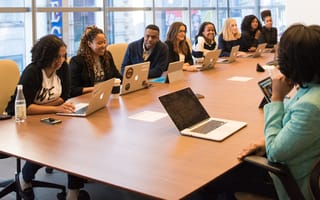Tech companies across the United States are reexamining their values and recommitting their programming, hiring and products to be more inclusive of Black, Indigenous and people of color (BIPOC) in light of the recent protests against police brutality and anti-Black racism spurred by the killings of George Floyd, Tony McDade, Breonna Taylor and other Black people. In addition to reflection, this is also a moment of action, one that asks companies to acknowledge where their diversity, equity and inclusion initiatives are lacking and strengthen them.
According to the numbers, companies don’t have to look very hard to find areas of improvement. Black tech workers make up less than 5 percent of employees at Salesforce, Facebook, Slack and Microsoft and less than 10 percent of employees at Twitter, Uber and Lyft. A study by San Jose State University, which used anonymized data provided by the Equal Employment Opportunity Commission, found that 10 large Silicon Valley tech companies employ no Black women and that three large Silicon Valley companies employ no Black people at all.
These stats lay bare just how much work the tech industry has to do to become more inclusive. We have a better idea of what that work entails after talking with leaders at Relativity, Ball Aerospace, Compass and Livongo. For these companies, inclusivity isn’t just an internal initiative but one that extends to their communities via student mentorship programs, fellowships for talent typically overlooked by the tech industry and pledge programs designed to drive investment toward Black professionals.
Diversity and Inclusion Initiatives from 4 Companies
- Expand DEI efforts to global business regions
- Diversify talent pipelines by partnering with diverse professional groups
- Unconscious bias training
- Expanding diversity efforts externally, working with advisors and vendors that have diverse teams

Charles Johnson, Senior Director of Diversity & Inclusion at Ball Corporation
When it comes to diversity, equity and inclusivity, where does Ball Aerospace have the most room for improvement?
Ball Corporation has a longstanding commitment to D&I, led by our centralized diversity and inclusion group and supported by our board of directors, executive leadership teams and employees. Collectively, we have made great progress in creating a work environment where all employees can be their authentic selves and contribute to our ongoing success in unique ways.
While we have achieved much in terms of the scope and impact of our programs, our greatest focus moving forward is expanding our D&I strategy to teams in our global business regions, to bring the same energy and focus that our North America teams have for diversity and inclusion.
“Recently, and as an example of our global D&I focus, we hired diversity and inclusion managers in our U.K. and Brazil locations.”
What is your organization doing to promote inclusivity in the tech community?
The scope of our efforts to promote inclusivity ranges from unconscious bias trainings, where employees learn to recognize common biases and avoid decisions based on preconceived notions, to employee resource group events, which are designed to bring awareness to current issues and foster unity among our employees. Our resource groups are spearheaded by employees with a passion for inclusivity in the workplace. These groups host activities like guest speaker engagements and learning sessions to support our culture of belonging.
The Ball Big Sister program creates direct relationships between women engineering students at CU Boulder and women engineering professionals at Ball. The purpose is to support women students pursuing engineering, which has a low retention rate for women majoring in the field, and to give broader context to the impact engineers make in improving society. Ball also focuses a great deal on hiring, developing and retaining women and individuals from other marginalized groups. Recently, and as an example of our global D&I focus, we hired diversity and inclusion managers in our U.K. and Brazil locations. All of our D&I initiatives are driven from the top down to reinforce accountability across the organization.
An in-depth analysis of diversity, equity, and inclusion in the technology industry.

Cassandra Blackburn, Head of Inclusion, Diversity & Belonging at Relativity
When it comes to diversity, equity and inclusivity, where does Relativity have the most room for improvement?
Relativity is committed to building awareness across the organization through education. Right now, we are driving learning and introspection through monthly events and by offering educational resources. In our view, the more educated we are, the better we can drive change.
A few example sessions that we have held in recent months include a panel conversation in partnership with The Nova Collective discussing the disproportionate impact of COVID-19 on communities of color and an internal panel discussion on the ways that allies shape the LGBTQIA+ experience and the intersectionality of our individual journeys. We also offer resources, coaching and support in understanding what it means to be an ally to our Black Relativian community and how to take action.
We plan to build upon these educational opportunities and continue diversifying our talent pipeline by partnering with diverse professional groups and universities to maximize the high performance of our teams. Relativity partners with various organizations across the country and in the Chicagoland area, including National Black MBA Association, Society of Women Engineers, National Society of Black Engineers and Latinas in Tech. However, we acknowledge there will always be room for improvement and are dedicated to learning and growing to foster a more inclusive workplace.
“The Relativity Fellows program aims to expand economic opportunity in the Chicagoland area by finding, certifying and employing untapped talent in traditionally overlooked communities.”
What is your organization doing to promote inclusivity in the tech community?
Our Social Impact program aims to build inclusivity within the broader tech community. We believe education is at the core of inclusive environments because when we know more, we do better.
Over the years, Relativity has committed $2.92 million in direct financial and in-kind donations to local public schools and nonprofits. Our Wired to Learn program enables local public schools to purchase the technology they need to close the opportunity divide for low-income students who otherwise may not have access to things like computers or calculators. Our monthly Geek Grants are awarded to educational or technological organizations working to make technology more accessible and STEM careers more inclusive.
Additionally, this summer we are kicking off the Relativity Fellows program, which will feature 10 to 12 fellows in its inaugural cohort. The Relativity Fellows program aims to expand economic opportunity in the Chicagoland area by finding, certifying and employing untapped talent in traditionally overlooked communities. By the end of the program, all fellows will be certified on our software and ready for placement in a full-time position with Relativity, our partners or our customers.

Arnnon Geshuri, Chief People Officer at Livongo
When it comes to diversity, equity and inclusivity, where does Livongo have the most room for improvement?
In 2019, 57 percent of Livongo’s hires were women and 41 percent were diverse employees. One factor driving these recruiting practices is our unconscious bias training, which we administer to all employees and continue to bolster. Everyone is considered a recruiter at our company, and we expect all employees to share in our mission and drive diversity efforts through interviewing, referrals and networking.
Based on internal survey data, between 2018 and 2019, the number of Livongo employees who felt that their hiring manager took diversity into account when making a hiring decision increased by 20 percent. Although we are making great progress, we are constantly looking to improve and are launching major initiatives in 2020 to enhance our diversity recruiting practices, ensure a safe space where employees can voice a variety of perspectives and continue to promote diversity programming so we all learn together.
“One of our most significant milestones in 2019 was achieving gender parity among managers. Today, 52 percent of managers at Livongo are women.”
What is your organization doing to promote inclusivity in the tech community?
One of our most significant milestones in 2019 was achieving gender parity among managers. Today, 52 percent of managers at Livongo are women. In the healthcare industry, women make up 80 percent of the workforce but hold only 28 percent of board seats and 35 percent of C-suite positions. These statistics are appalling, and this is an area where we want to take a leadership role, not only in digital health but across the entire healthcare industry.
As part of this thinking, Livongo launched the She Powers Health awards in 2019. We kicked off the annual event at the HLTH conference, where we recognized those who made a significant impact on people’s health, empowered women and modeled diversity and inclusion in the workplace. We collected nominations from across the industry and brought together a panel of esteemed judges to select the finalists.
In addition to She Powers Health, we’re launching an internal initiative to recognize the strong group of women at Livongo and provide tools and resources for them to continue growing as leaders and mentors to others.

Margaret Smith, Head of Talent at Compass
What is your organization doing to promote inclusivity in the tech community?
In addition to recruiting, retaining, mentoring and promoting diverse talent internally, Compass is advocating for representation in business and economic empowerment for the Black community outside of our company. Compass has committed to only working with advisors and vendors — lawyers, accountants, bankers and so on — that have at least one Black person on the team directly advising Compass.
“Compass has committed to only working with advisors and vendors — lawyers, accountants, bankers and so on — that have at least one Black person on the team directly advising Compass.”
We also created a “15% Pledge” for the over 17,000 real estate agents who are our customers. We have invited Compass agents — and all agents across the industry — to join the pledge to drive 15 percent of their real estate vendor spend and referrals to Black professionals. There are 2 million real estate agents in the United States at the center of real estate spend — more than $15 billion comes through vendors they use, such as photographers, contractors, painters, landscapers, stagers, movers, inspectors, attorneys and more. If real estate agents worked with vendors that reflected the diversity of the country, where 13% of the country is Black, Black-owned businesses would earn more than $2 billion per year from real estate agents alone.
All responses have been edited for length and clarity.
Editor’s note: Livongo’s entry has been updated: “In 2019, 57 percent of Livongo’s hires were women and 41 percent were from other marginalized backgrounds” has been changed to “In 2019, 57 percent of Livongo’s hires were women and 41 percent were diverse employees.”
Editor’s note: Charles Johnson’s title has been updated from“Senior Director of Diversity & Inclusion at Ball Aerospace” to “Charles Johnson, Senior Director of Diversity & Inclusion at Ball Corporation.”
Editor’s note: Cassandra Blackburn’s responses have been updated to include information on a panel discussion Relativity hosted with The Nova Collective as well as the names of organizations Relativity partners with nationally and locally.
How to create core values that will inspire your workforce.




